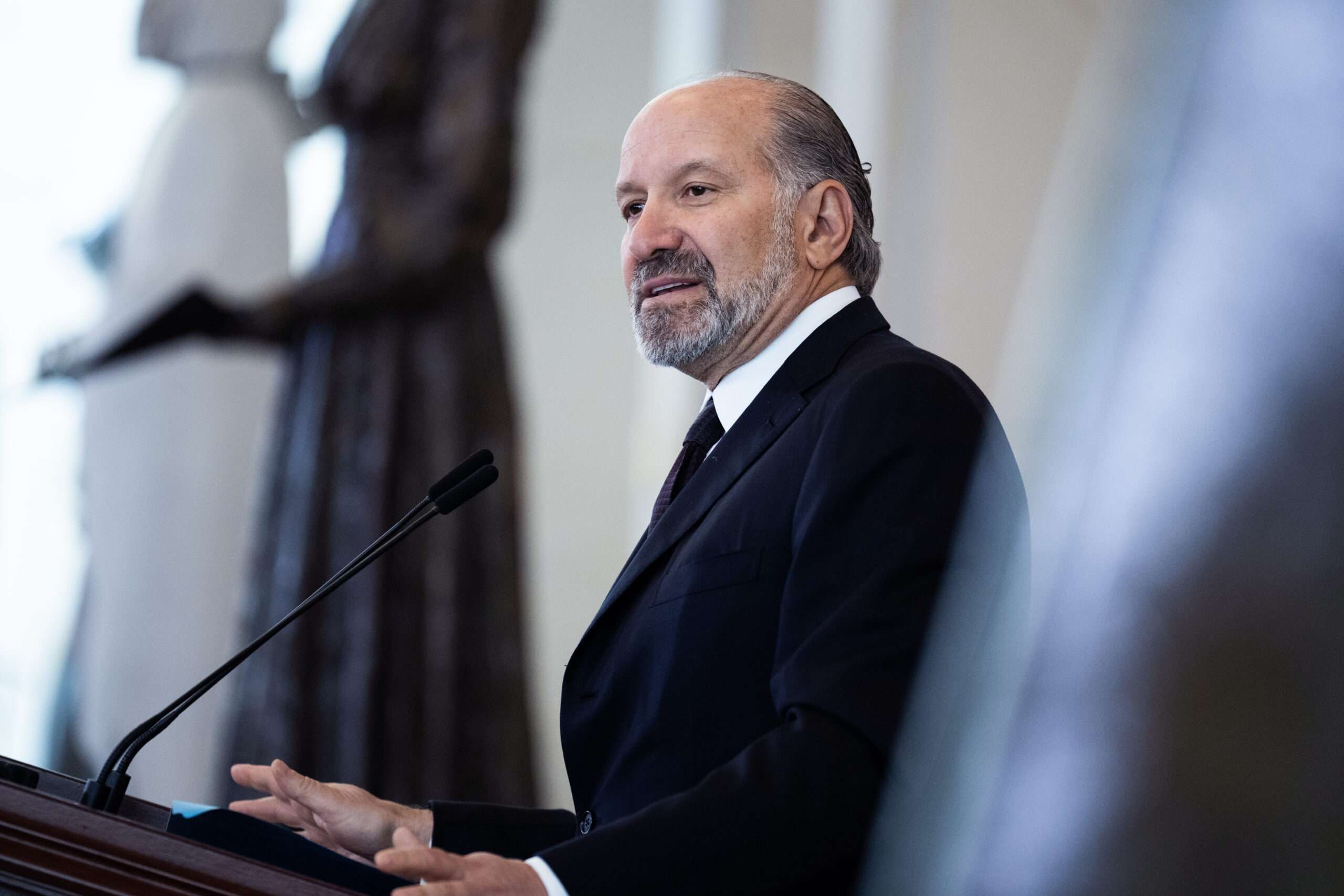You Will Work in the Factory and You Will Like It

I am not cut out for the factory life: Sorry to disappoint Commerce Secretary Howard Lutnick, who apparently has big plans for us all. "You go to the community colleges, and you train people!" he says, before listing two universities—Arizona State University and Grand Canyon University—that are decidedly not community colleges. "It's time to train people not to do the jobs of the past, but to do the great jobs of the future. You know, this is the new model where you work in these kinds of plants for the rest of your life and your kids work here and your grandkids work here. You know, we let the auto plants go overseas. Now you should see an auto plant, it's highly automated but the people, the 4-5,000 people who work there, they are trained to take care of those robotic arms." Lutnick seems very enthusiastic about other people and their kids and grandkids laboring in factories for their entire working lives. https://t.co/uykrvpBBRK — Zach Weissmueller (@TheAbridgedZach) April 30, 2025 To me, Lutnick's vision is sort of the opposite of the American dream. No disrespect to the 13 million Americans who work in manufacturing, or the roughly 2.4 million who work on farms (related labor, in that it's a category that's drastically declined over the last century, to the ire of some of the retvrn types), but possibly the best thing about America is the upward mobility that allows many families to, over generations and with hard work, graduate from these more tedious forms of labor. That was my family's story, at least: My granddad grew up on a farm but was able to leave and go to school and get out of Dodge (almost literally—he is from a town close to Dodge City, Kansas, where the expression originated), providing for his family by moving to Texas and working in the early tech boom, for companies like Motorola and Texas Instruments. Of course, there are some families for which this isn't the case. Many people had their factory work dry up and disappear, finding nothing decent in its wake. Between 2000 and 2010, across Illinois, Indiana, Michigan, Minnesota, Ohio, and Wisconsin, "manufacturing employment dropped by 35 percent in 10 years…eliminating 1.6 million jobs." Deaths of despair in the affected regions have risen. But the unemployment numbers in the Rust Belt and Midwest manufacturing areas have bounced back a lot in recent years. Also—relevant to Lutnick's point—the look of American manufacturing has changed a lot over time. "Since 2016, the number of men with Ph.D.s working in manufacturing has risen by 50 percent," says Zanny Minton-Beddoes, editor in chief of The Economist. "Manufacturing is increasingly a high-skill, high-end activity. You shouldn't assume that more manufacturing jobs means more jobs for male workers of the sort that I think both Donald Trump and President Biden have in mind when they're talking about bringing good manufacturing jobs back to the United States." Lutnick appears to be gesturing at this, but he's going to run into issues of scale—automation-supervising needs far fewer people devoted to it than when humans were doing much more of the granular work. And the vision he's selling—where future generations have no prospects of moving up the economic ladder—isn't a very compelling one. Romanticizing the factory floor is a rich man's game, the type of thing done only by people who have no experience of it. People who've actually worked in factories don't tend to want to stay there forever and choose to get out if they can. But don't take it from me, take it from the internet's favorite prostitute, who has truly done it all: I spent a year working on a factory floor assembly line and I cannot overstate how unpleasant it was. After the factory, sex work was a blessed escape https://t.co/K50ZPm9OwR — Aella (@Aella_Girl) April 6, 2025 Some of the "bring back the Rust Belt" sentiment surely has to do with a misplaced nostalgia for Main Street and all it represents more than an actual preference for work on factory floors: Middle-class and poor Americans (and those in the media who claim to speak for them) perhaps desire "the underlying values of Main Street," writes economic historian Louis Hyman, like "living and working with autonomy in your own small community." But "small stores are inefficient," Hyman continues. "Local manufacturers, lacking access to economies of scale, usually are inefficient as well. To live in that kind of world is expensive." Globalization and outsourcing and massive chains are the easy culprits, but those are also the things that drive prices down to an affordable level. Of course, some tariff apologists—like journalist Batya Ungar-Sargon—seem to think things like iPhones are luxury goods, that it just doesn't really matter if poor people are soon deprived of them, forced by tariffs to go backward 10 or 15 years. But millions of Americans returning to the factory floor, with flip phones in their pockets, doesn't seem like a recipe for widespread fulfillment and economic flourishing to me, nor a viable political strategy for the GOP. My hunch is that people don't like it when their living standards get drastically worse. Amazon vs. Trump: Punchbowl News reported on Tuesday that Amazon would soon show shoppers how much of an item's cost stems from tariffs, putting that information right next to the item's listed price, seemingly a means of making clear to consumers that they're not just arbitrarily jacking up prices. "This is a hostile and political act by Amazon," said White House press secretary Karoline Leavitt in response. But why would it be hostile if tariffs are so great? Trump allegedly called Jeff Bezos after the article was published. "Jeff Bezos is very nice," said Trump later. "Terrific. He solved the problem very quickly. He did the right thing. Good guy." Amazon appears to have backed down, though its official story is a bit more face-saving. "The team that runs our ultra low cost Amazon Haul store considered the idea of listing import charges on certain products," said Amazon spokesman Tim Doyle said in a statement. "This was never approved and is not going to happen." It's hard to know what exactly happened here, but showing how much more the consumer is charged because of the tariff policy is a good idea. Trump pokes Powell: "Inflation is basically down and interest rates came down despite the fact that I have a Fed person who's not really doing a good job," Trump said at a rally celebrating 100 days in office yesterday, referring to Federal Reserve Chair Jerome Powell. He is correct that inflation is down and that core inflation in particular is experiencing a low since March 2021, but this is probably mostly because of Jerome Powell and his colleagues, not in spite of him: Careful rate hikes did eventually tamp down inflation from its Biden-era peak in 2022 without triggering a recession, though inflation does remain a little bit above target. But, perhaps more importantly: It's possible inflation will rise again (and markets certainly aren't doing so hot), due to Trump's tariff impositions, the full effects of which will be felt more next month as consumers feel the impact of reduced shipping volumes from China. "You're not supposed to criticize the Fed," he continued. "You're supposed to let him do his own thing—but I know much more than he does about interest rates." Trump has, in the past, made noises about firing Powell, then backtracked. Now he's back to scapegoating Powell when he has only himself to blame for the current economic turmoil. Earlier that day, Trump had finalized and signed a carveout, exempting certain auto components from higher tariff rates for a span of two years. ("I want them to make their parts here," said Trump at his rally. "We gave them a little bit of time before we slaughter them if they don't do this.") This gives carmakers a bit of breathing room, but it's also worth noting that he could've just done a gradual phase-in from the get-go. There's no reason to move so erratically and create all this economic volatility. Scenes from New York: Assimilation discourse From 1880 to 1920, two million Jews moved to the US, and NYC's Lower East Side was very Jewish, with a dozen Yiddish papers. But their kids assimilated, never learned Yiddish, and now the Lower East Side is filled with Asian immigrants. America is good at absorbing new folk. https://t.co/cUDwevVcfH — Carl (@HistoryBoomer) April 28, 2025 "A net 30,000 New Yorkers fled the city for Florida's Palm Beach and Miami-Dade counties in the five years through 2022, taking with them a combined $9.2 billion in income, a new report shows," reports Bloomberg. Honestly, good for them. It's crazy how NYC politicians act like high-earners can just be infinitely taxed with no consequences. "I would say that we live in a democracy, and part of the responsibility of being a parent is to do your own research," said Health and Human Services Secretary Robert F. Kennedy Jr. in response to an audience question on Dr. Phil who asked what he would say to new parents about vaccine safety. "You research the baby stroller, you research the foods that they're getting, and you need to research the medicines that they're taking as well." Much of the media is apoplectic about this, but it seems…reasonable? Checking in on the Working Families Party: Murderer gets out of prison. Becomes "social justice abolition" advocate for Working Families Party. Progressive prosecutor Krasner is "honored to accept their endorsement." but he murders again and Krasner now has to prosecute him. You really can't make this up. pic.twitter.com/1AaUuxjwg5 — Peter Moskos (@PeterMoskos) April 30, 2025



















